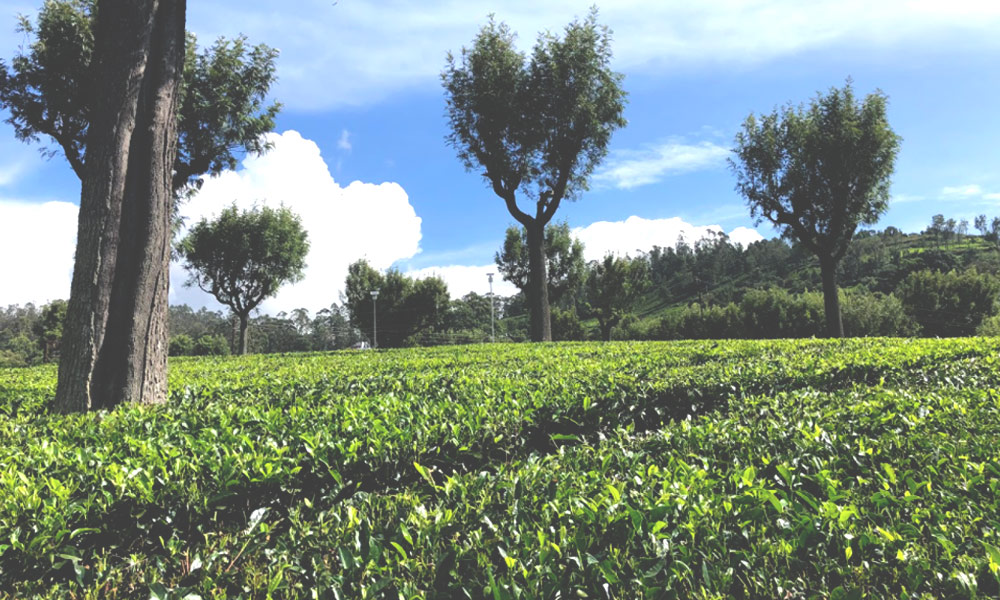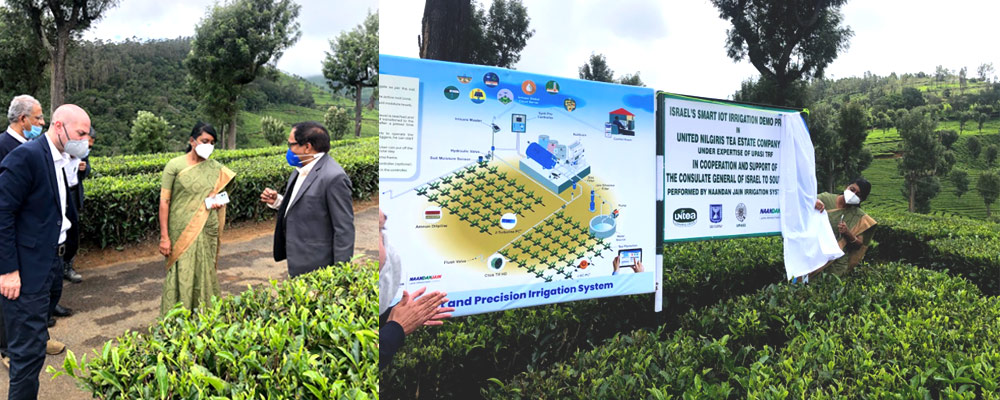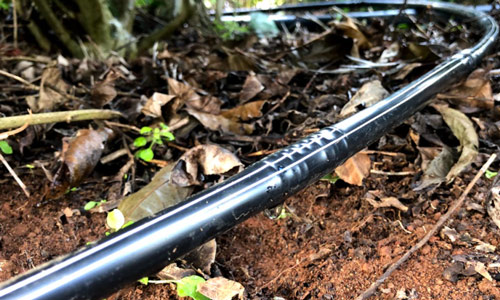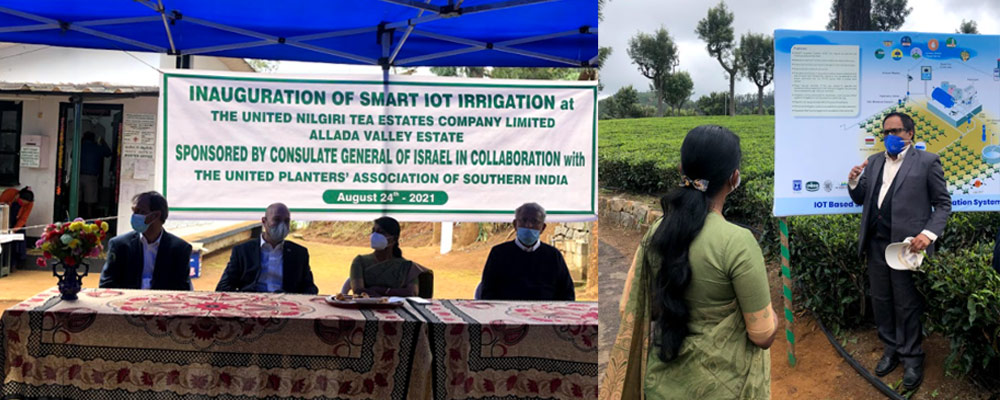Welcome to Jain Irrigation Systems Ltd.

Jain Irrigation <> Israel Consulate, India.
Launches Smart IoT Irrigation Project in Ooty’s Tea Plantation
The Consulate General of Israel to South India, in collaboration with United Planters' Association of Southern India (UPASI), Jain Irrigation Systems, and NaanDanJain Irrigation, launches Smart IoT Irrigation Project in Tea Plantation in Ooty, Tamil Nadu.
Smart IoT Irrigation is an innovative Israeli technique that uses water judiciously and helps farmers achieve higher levels of crop yield with a minimal amount of water. The irrigation system has been installed on a 5"acre plot in United Nilgiri Tea Estates Company Pvt. Ltd. in Allada Valley of Ooty. This installation, which is a first"of"its"kind to be used in tea plantations in India, is an attempt to introduce a robust, tailor"made irrigation solution. The system involves a combination of drip technology, automation, and fertigation, and aims to empower growers to produce higher yields of better-quality crops with fewer resources and was designed and implemented by Jain irrigation.
India, which is the second"largest tea producer in the world, has been facing several challenges to sustain tea production over the years. Tea plantations continuously remain under threat owing to climate change and seasonal effects. Moreover, tea being extremely sensitive to climate change has its specific temperature and precipitation requirement. Untimely rainfall, low or no rainfall in crop season, prolonged dry spells, sometimes flood"like situations, and increasing temperature are major challenges in almost all tea estates. Another important factor limiting tea growth is the injudicious management of nutrients. The soil in hilly areas where tea is grown is generally low in fertility; hence fertilizer application becomes one of the key management practices.

To help tea growers in India experience the wonders of precision farming, the Israel Consulate, with the help of MASHAV (Israel’s Agency for International Development Cooperation) and UPASI (the apex body of planters in South India), has identified two leading providers of tailor"made irrigation solutions – Jain Irrigation Systems Limited (India) and NaanDanJain Irrigation Limited (Israel) – and entrusted them with the responsibility to execute this project. The two companies have extensive experience and expertise in modern farming techniques that deliver increased productivity per unit of resources, improve yields, and support a sustainable future. With the world facing challenges of growing needs for food and water resources, the two companies have been actively playing an important role by leading each drop of water to its crop.
 The precision irrigation system aims to
address all the critical issues and offers to assist in judicious usage of water as well as
precise fertigation throughout the process of tea production.
The precision irrigation system aims to
address all the critical issues and offers to assist in judicious usage of water as well as
precise fertigation throughout the process of tea production.
Jonathan Zadka, Consul General of Israel to South India, said, "This is an exciting day in which together with our partners we are able to introduce an IoT"based drip irrigation system in tea plantation. With this, we hope both the yield and the quality of the crops would improve. This project allows growers and the public to benefit from a highly sophisticated system, and further emphasizes the bond between Israel, India, and the Indian farmers.
Joseph Abraham, Consul for Trade and Economic Affairs, said, "As I live in an agricultural village, it is always a privilege to witness the use of Israeli technology and innovation for the benefit of the famers and farming to increase crop harvest and at the same time using less water resources. We wish all involved success in this initiative and look forward to further enhancing Israel " India economic ties."
R Victor J Ilango, Director of UPASI, said, "We are happy to collaborate with the Israel Consulate and the Chamraj Group to execute an IoT"based smart irrigation system for tea in The Nilgiris. During drought, evaporative demand is high and transpiration loses are greater, leading to water stress. Prolonged internal water stress has an adverse effect on the growth rate of crop shoots, thereby influencing the yield of tea. With this project, we wish to optimize the volume and frequency of water for the drip irrigation, study the method and impact of fertigation through the drip, quantify the increase in productivity of tea due to drip irrigation with fertigation, determine the impact on nutrients availability in soil and green leaf, and validate the probes / sensors for their usage for irrigation.

Dr P. Soman, Chief Agronomist at Jain Irrigation Systems Ltd., said, "Jain and NaanDan Jain together are bringing the latest sensor based precision irrigation based on real time soil moisture status for Tea for the first time in India, though micro irrigation has been in vogue for Tea for many years. The automation implemented in the system allows remote access and control as well. We are happy to associate with the Israel Consulate (South India) in bringing cutting"edge technology for irrigation and fertilizer dosing for Tea in Allada Tea estate through UPASI. Hope this pilot would be a game changer for the entire Tea industry. These technologies would conserve water, energy and fertilizer chemicals while improving yield of Tea and maintaining soil health."
TGP Pinto, Director of Chamraj Group, said, "We have taken the initiative to explore the IOT"based smart irrigation system for tea in the Nilgiris in collaboration with the Israel Consulate, UPASI, and Jain Irrigation Systems. Water is a major factor limiting the yield of tea during drought period in majority of tea areas. Due to seasonal pattern of rainfall, tea areas are exposed to varying periods of drought lasting from two to five months in various planting districts of south India. Maintaining adequate moisture status in the soil gives consistently higher crop when other environmental factors are optimum. Under these circumstances, drip irrigation assumes significance for increasing the yield and for even distribution of crop.


